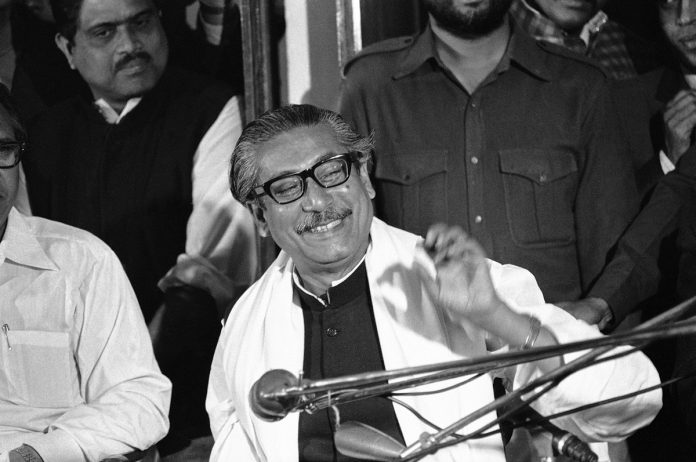On March 17th, Bangladesh commemorates the 104th birth anniversary of its founding father, Bangabandhu Sheikh Mujibur Rahman, a towering figure whose legacy continues to shape the nation’s identity and aspirations. Born on this day in 1920 in Tungipara, a small village in what was then British India, Bangabandhu’s life journey epitomizes the struggle for independence, democracy, and social justice.
Bangabandhu’s early years were marked by a fervent desire for education and a deep-seated commitment to serving his community. Despite facing numerous obstacles, including financial hardship and political repression, his determination remained unwavering. His journey from a humble background to the forefront of the independence movement reflects the indomitable spirit of resilience and courage that defined his character.
Throughout his life, Bangabandhu advocated tirelessly for the rights and dignity of the Bengali people. As a charismatic leader and visionary statesman, he galvanized the masses with his stirring rhetoric and unwavering dedication to the cause of liberation. His stirring speeches, including the historic “7th March Speech” in 1971, inspired millions to rise up against oppression and tyranny, igniting the flames of freedom that ultimately led to the birth of Bangladesh.
Bangabandhu’s political awakening coincided with the tumultuous period of British colonial rule and the struggle for independence. Inspired by the ideals of democracy and self-determination, he emerged as a vocal advocate for the rights of the Bengali people, tirelessly campaigning against social injustice and economic inequality.
The pivotal moment in Bangabandhu’s life came with the emergence of East Pakistan, following the partition of British India in 1947. Despite being geographically separated from West Pakistan, the Bengali population faced systemic discrimination and marginalization at the hands of the ruling elite in Islamabad. Bangabandhu emerged as the voice of dissent, spearheading the movement for autonomy and linguistic rights for the Bengali-speaking population.
The watershed moment in Bangabandhu’s political career came with the historic 1970 general elections, which saw his party, the Awami League, secure an overwhelming mandate in East Pakistan. However, the refusal of the ruling establishment in West Pakistan to honor the democratic verdict sparked widespread protests, culminating in the declaration of independence on March 26, 1971.
Bangabandhu’s leadership during the Bangladesh Liberation War remains unparalleled in the annals of history. His historic speech on March 7, 1971, galvanized the nation’s resolve for independence, inspiring millions to join the struggle against oppression and tyranny. Despite enduring imprisonment and persecution, Bangabandhu remained resolute in his commitment to the cause of freedom, emerging as the undisputed leader of the Bangali nation.
The culmination of Bangladesh’s independence on December 16, 1971, marked the crowning achievement of Bangabandhu’s lifelong struggle. As the architect of the nation, he assumed the mantle of leadership, guiding Bangladesh through the arduous process of nation-building and reconstruction.
Bangabandhu Sheikh Mujibur Rahman’s leadership during the Bangladesh Liberation War of 1971 was pivotal in securing the nation’s independence from Pakistan. Despite enduring imprisonment and persecution, he remained resolute in his commitment to the cause, refusing to compromise on the principles of justice and self-determination. His unwavering determination and moral courage earned him the title of “Bangabandhu”, meaning “Friend of Bengal”, a testament to his deep bond with the people he led.
Following Bangladesh’s independence, Bangabandhu assumed the mantle of leadership as the nation’s first President and later as its Prime Minister. His vision for a democratic and inclusive society guided his policies, which prioritized social welfare, economic development, and national unity. Under his stewardship, Bangladesh embarked on a journey of nation-building, laying the foundations for a modern and progressive state.
Tragically, Bangabandhu’s life was cut short in a brutal assassination on August 15, 1975, along with most of his family members. His untimely demise plunged the nation into mourning and left a void that could never be filled. However, his legacy endured, serving as a guiding light for future generations to follow.
As Bangladesh celebrates the 104th birth anniversary of Bangabandhu Sheikh Mujibur Rahman on March 17, 2024, his towering stature as a leader and statesman looms large in the nation’s collective consciousness. His ideals of democracy, justice, and equality continue to inspire Bangladeshis across generations, reminding them of the sacrifices made by their forefathers for the cause of freedom.
As the nation reflects on Bangabandhu’s legacy, it is incumbent upon all Bangladeshis to uphold the values he stood for and to strive towards realizing his vision of a prosperous and harmonious society. By embracing the spirit of unity, resilience, and compassion exemplified by Bangabandhu, Bangladesh can overcome any challenge and achieve its full potential as a beacon of hope and progress in the world.




